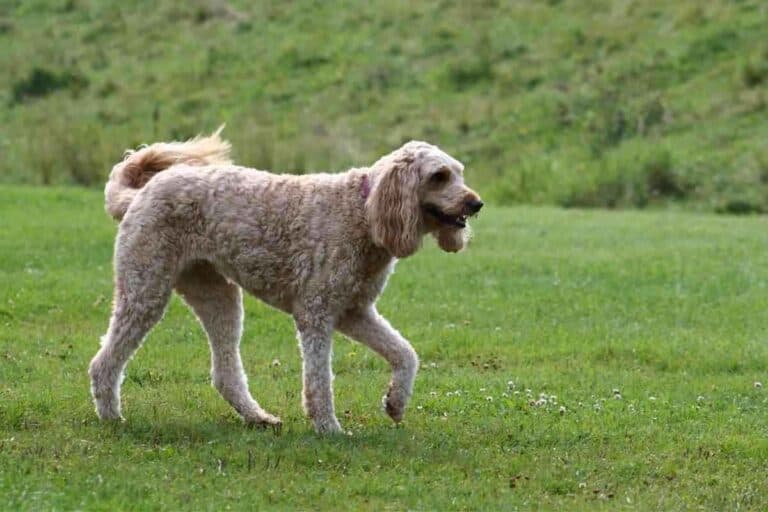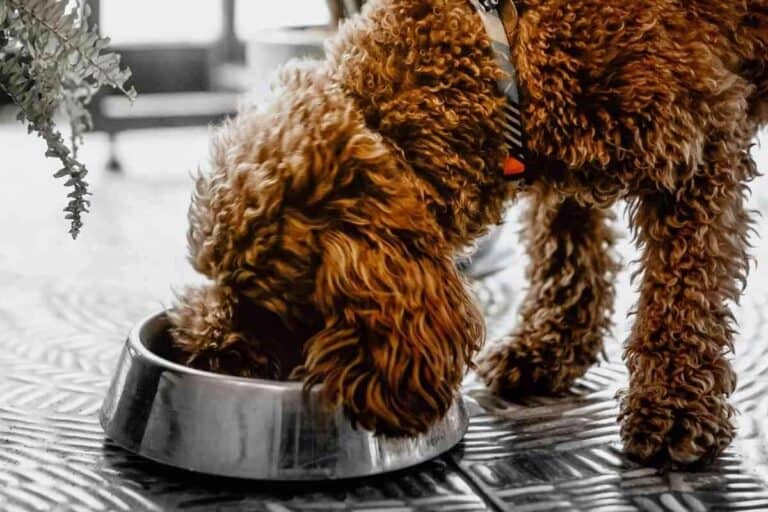Are Labradoodles Big Chewers?
If you are looking into getting a new dog or puppy, you might be looking into getting a Labradoodle.
Labradoodles are loyal and easy to train, making them great dogs for families or people living alone.
Along with many other questions you might have about your new puppy, you might be wondering if they are big chewers.
Are Labradoodles Big Chewers?
Similar to all puppies, Labradoodles tend to chew on items they find around the house until they are about 9 months to one year old. Once they full have their adult teeth, they will stop chewing on things. If your dog is still chewing on things after one year of age, it might have a medical or behavior problem.
This is good news to most people because it means they can relax after their Labradoodle turns one.
They no longer have to worry about furniture or other household items being destroyed. However, you need to make sure you are training your puppy correctly to make sure they don’t enter adulthood with bad chewing habits.
Do Labradoodles Chew a Lot?
Labradoodles are not as big of chewers as other types of dog breeds.
However, they will chew on things as puppies much like most puppies in the world.
Even though it’s typical puppy behavior, you don’t want to allow the dog to constantly chew on furniture or other house items.
This might lead them to believe that this is okay, and they will continue to do it every time they get bored.
Dogs can also get a taste for furniture and certain textures and then not want to play with chew toys.
From the very first day, you get them, you want to make sure you give them chew toys and other items they can chew on.
This will teach them what they can and cannot chew on.
It will also allow them to get a taste for only the toys and they will be less inclined to chew on furniture.
If your dog is still chewing furniture after they become an adult, consider if they are bored or anxious.
If you leave them alone for long periods of time, they might be more inclined to find things around the house they shouldn’t be chewing on.
Make sure you are walking them often and getting their exercise in before you leave for work or to run errands.
You might need to consider crating them as well if they are chewing too often.
If the dog is chewing on everything they can find, you need to keep a careful eye on them.
They might end up chewing on electrical cords or getting into toxic materials which can affect their health.
Make sure you put any cleaning materials or other toxic materials on a high shelf or in the closest.
Make sure you keep dry goods out of reach as well as you don’t want the dog to eat something that can be poisonous to them.
Make sure you have a designated area for their toys and bones and keep them in the same place.
This will ensure your dog knows where to find their dogs, so they don’t want to go and chew on other things instead.
If your dog chews or swallows a metal object or other potentially dangerous item, take time to the vet right away.
You can also consult the vet about why your dog might still be chewing as an adult and if they have any issues that need to be corrected.
If your Labradoodle has a health or medical problem that affects their teeth development, you might see them chewing longer even though they are not a puppy anymore.
Make sure the vet checks their teeth and mouth to make sure everything is developing correctly.
Are Labradoodles Destructive?

If your Labradoodle gets enough exercise and attention, it should not exhibit destructive behavior. They need 30 to 60 minutes of exercise every day.
If you go too many days without them exercising, they may start to chew on things or exhibit other destructive behaviors.
Their attitudes might also become very hard to handle if they are not getting enough exercise.
Labradoodles might also become anxious if they are left alone for too long.
This can cause them to destruct things around the house.
Keep in mind that Labradoodles are high-energy and need proper training.
If you fail to train them when they are young, they might become very mouthy and want to destroy things around the house.
From a very young age, teach your Labradoodle to now chew on things around the house.
Labradoodles are very playful, so you need to give them plenty of attention and love.
The more time you spend with them and the more time you spend being active with them, the less likely they are to be destructive.
Why Do Labradoodles Chew?
As a puppy, a Labradoodle will chew because their mouth and teeth are developing. They feel the need to chew because it soothes their teeth.
It also helps their teeth develop. They are more likely to chew if they are bored.
They are also more likely to chew if they have separation anxiety if they aren’t feeling well.
Keep in mind that chewing even during teething is not good unless they are chewing on designated toys or bones.
Never allow them to chew on household items even if they are teething and need something to soothe their mouth.
How Can I Train My Dog Not to Chew?
Whether they are a puppy or an adult, you will want to train your dog to not chew on things they shouldn’t be chewing on.
Getting them appropriate chew toys is the best way to train them not to chew on items around the house.
If you notice they prefer one toy over the others, try to get more toys from the same material or textures they will have plenty on hand to keep them busy.
Make sure they always have the toy during times where they might be more likely to start chewing on furniture or other items.
For example, always leave them the chew toy when they are home alone or when they are in their crate.
If you are busy around the house and can’t keep an eye on them, make sure they have their chew toy handy to keep them occupied.
Consult your vet if you aren’t sure what dog toy to buy.
If you want them to chew on bones, make sure you are getting ones with healthy ingredients and that are age-appropriate.
If you catch your dog chewing on something, take it away immediately and put them in its crate.
Let them know it’s bad behavior and be firm with them.
Never hit them or act aggressively though as you don’t want your dog to be afraid of you.
If you notice they have chewed on something or find a torn-up shoe several hours later, you cannot punish them.
They won’t remember the act even if you show them the item.
Just let it go and try to punish them the next time you catch them while they are still chewing.
What are Bad Things About Labradoodles?
Overall, Labradoodles are good dogs with easy temperaments and easy to train.
Just like with any dog though, they can have bad tendencies if you don’t train them correctly or if you leave them alone for too long, especially as puppies.
Labradoodles have bossy behaviors and will assume they are the head of the pack.
This means they may show resistance when it comes to verbal commands, and they may demand food in between mealtimes.
The good news is that this can be easily fixed if you train them starting from a very young age.
Labradoodles are very high-energy and are not meant to lay around all day.
If they don’t get enough exercise and attention, they will tear up the house and start to show symptoms of anxiety.
They will also bark much more often when they are left alone for too long.
This can be annoying and be bad news for your house if they start to chew on furniture or shoes.
Labradoodles are also prone to many health issues as they age and grow.
They are most prone to ear infections, problems with their eyes, food allergies, and hip or elbow dysplasia.
Ask the breeder for more information so you can better prepare for the issues you might face in the future.
Labradoodles can also be very expensive dogs.
You want to make sure you are working with a reputable breeder that breeds healthy Labradoodles.
Final Thoughts
In general, Labradoodles are not big chewers after they become adults.
They will chew as puppies just like every other dog.
As long as you train them well and give them plenty of access to chew toys and bones, they should stay away from the furniture.
You also need to make sure they get enough exercise and family time so they don’t feel the need to get bored and chew.






